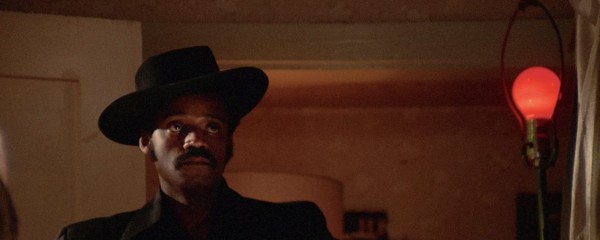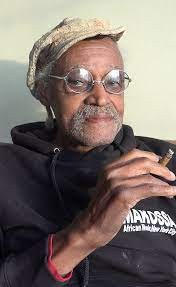THE YOUNG VAN PEEBLES IN SWEET SWEETBACK (1971)
SWEET SWEETBACK'S BADASSSSS SONG; AHED'S KNEE; THE TSUGUA DIARIES
Melvin van Peebles' black indie classic SWEET SWEETBACK'S BADASSSSS SONG (which I've still never seen), a featured revival in a restored print at the NYFF, has a more plangent meaning because of Peebles' demise in his home in Manhattan last week. He was 89. He was the forerunner of Spike Lee, Barry Jenkins, and the rest.
A Renaissance man whose work spanned books, theater and music, Mr. Van Peebles is best known for his third feature film, “Sweet Sweetback’s Baadasssss Song,” which drew mixed reviews when it was released in 1971, ignited intense debate and became a national hit. The hero, Sweetback, starred in a sex show at a brothel, and the movie sizzled with explosive violence, explicit sex and righteous antagonism toward the white power structure. It was dedicated to “all the Black brothers and sisters who have had enough of The Man.” -NYTimes obituary.
MELVIN VAN PEEBLES
Born: August 21, 1932, Chicago, IL
Died: September 21, 2021
Van Peebles’s vision of the devastating police violence that Black Americans endure at home (indeed, even literally inside their homes), and of the resulting deformations of their ordinary lives into an extraordinary heroism of resistance (or merely of survival)—has an eruptive urgency.
Brody says among the new NYFF films shown this week Israeli director Nadav Lapid''s AHED'S KNEE stands out "for its political outrage and bitter defiance":From the film’s very first scene, Lapid candidly displays and furiously denounces the militarization and oppressive nationalism of Israeli society. It’s the story of a fortysomething Israeli Jewish filmmaker, identified only as Y (and played by Avshalom Pollak), who flies alongside Israeli soldiers, in a small, shuttle-like plane, to a village in the Negev desert, near the Jordanian border, where he’s presenting one of his films at a local library. A cheerful young woman named Yahalom (Nur Fibak), a native of the village who works for the country’s Ministry of Culture, greets him there. She’s as affable and welcoming as he is grumpy and skeptical, and they quickly bond—dialectically, platonically, over art and politics. He discloses to her, in great detail, the horrors of a seemingly suicidal mission that he had participated in as an Army intelligence officer. She reveals to him her unease with the censorious regulations that her ministry imposes on cultural activities. He unleashes a torrential, seemingly inexhaustible rant about Israel’s government, its ethos, and what he considers the moral and intellectual numbing of the citizenry to the country’s criminal policies—and he plans to publish a damning report about this trip.-
Richard Brody.
AHED'S KNEE
Brody's outstanding commentaries on movies appear in "The Front Row" on The New Yorker online every week. He goes on this week to comment on Maureen Fazendeiro and Miguel Gomes’s film “The Tsugua Diaries”, a film set in rural Portugal over 22 days in August, shown in reverse chronological order. ("Tsugua" is "August" spelled backward. ) This is a film about itself, making itself and about the people making it, and "love and filmmaking in the time of covid."Fazendeiro and Gomes film the carefully tended settings with a passionate but serene observational joy and the actors with a restrained, gentle affection: in art and life alike, these people and places all shiver with the promise of love and the spectre of death. -
Brody, New Yorker.







 Reply With Quote
Reply With Quote


Bookmarks